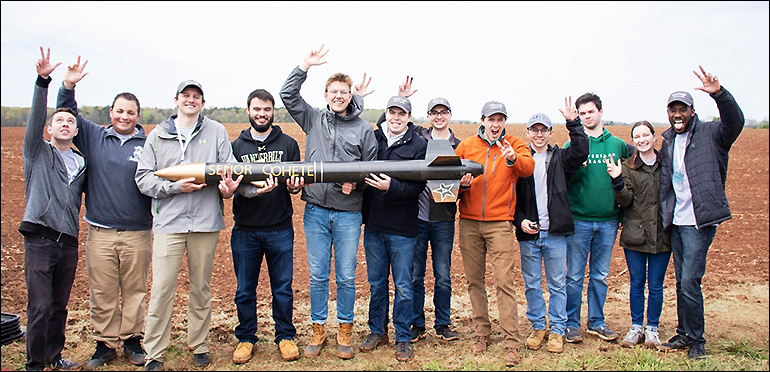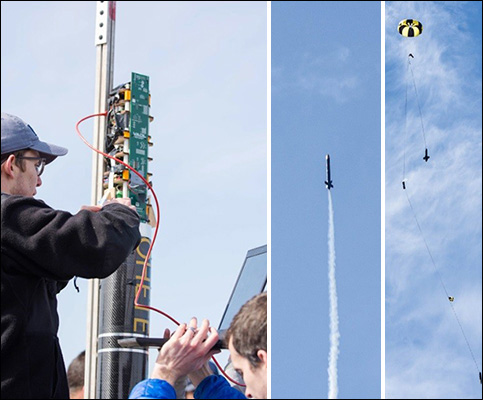
The Vanderbilt rocket team collected a key award at the NASA’s Student Launch Challenge and followed up with a successful flight of their rocket Sunday, April 8, at Bragg Farms in Toney, Alabama.
At the awards banquet at the U.S. Space and Rocket Center in Huntsville April 7, Vanderbilt – four-time national champs – won the coveted payload design award, and had top three finishes in the rocket design, project review, and educational engagement categories, setting up a strong challenge for the overall championship.

The Vanderbilt team designed a novel two-part rocket with sectional roll control (SRC) that enables the forward payload section to steadily image ground targets while the bottom section compensates for the rocket’s natural roll.
“Payload design requires creative innovation and the seamless integration of modern engineering science principles into technical design, and this where we have excelled the most,” said Amrutur Anilkumar, professor of the practice of aerospace and mechanical engineering. The Vanderbilt team has always been particularly strong in the payload category. This is the eighth payload design award the team has won during its last eleven entries in the NASA university rocketry competition.

Teams will submit flight reports April 27 and after a detailed review of flight data, NASA will announce final overall results in early May. Thirty-four of the original 45 competing university launch teams from 21 states made it to the final shoot out. They included teams from Cornell, Carnegie Mellon, UNC Charlotte, Louisville, Northwestern, Notre Dame, Iowa State, Illinois, Penn State and Florida, all competing for individual category awards and a $5,000 cash prize.
“It was a blustery cold morning and everyone was literally freezing as they went about preparing their rockets, but I guess we all have to be prepared for such field challenges. A lot of my friends from Vanderbilt and my parents came down to watch the launch. SEÑOR COHETE – Mr. Rocket – took off beautifully, reached apogee and the parachutes deployed as planned and landed safely for a successful launch,” said senior Katie Hornbeck, recovery systems lead on the team.
“With the high winds and the cold temperatures, we were prepared for a lower altitude than one mile and guessed that it would be about 4850 feet. The rocket reached 4838 feet,” said Nick Galioto, flight analytics lead on the team.
The Sectional Roll Control performed as planned and the team has good data from the instrumentation that they will be analyzing in the next two weeks and reporting to NASA. NASA had to postpone launches to Sunday due to persistent rains on Saturday, April 7.
Supported by the Human Exploration and Operations Mission Directorate and U.S. aerospace industry, University Student Launch is a NASA-conducted engineering design challenge built around a NASA mission. It is an eight-month commitment to design, build, and fly payloads that support Space Launch System (SLS). The SLS Program Office and its industry partners choose the research and investigation projects.
The process mirrors the NASA engineering lifecycle, with design reviews, a flight-readiness review, and a launch-readiness review that includes a safety briefing. Design reviews, which carry 55 percent weight in NASA scoring and the launch Sunday carries a 20 percent weight. Outreach efforts count 10 percent, a team’s website is 5 percent, with the final report an additional 10 percent, in what will be a closely fought contest.
Apart from serious non-stop engineering, the Vanderbilt team also is passionate about science outreach to area schools. “This year we reached out to about 1,700 middle and high school students in middle Tennessee, teaching them elements of design and aerospace engineering using a hands-on Wright Brothers’ Wind Tunnel we developed. It was an extremely gratifying experience,” said Chris Romanoski, educational outreach coordinator on the team.
“For me this whole experience of working with a team of extraordinarily talented team mates and going through the rocket and payload design cycle in a eight month boot camp has been an invaluable training that I will take as I enter US Navy Pilot Training School,” said graduating senior Taylor Parra.
MORE>> Novel two-part rocket design addresses NASA challenge – launch is April 7
For more information: www.vanderbilt.edu/usli
Contact:
Brenda Ellis, (615) 343-6314
brenda.ellis@vanderbilt.edu